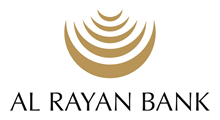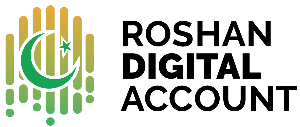
Islamic banking, Islamic finance, or Sharia-compliant finance is banking or financing activity that complies with Sharia and its practical application through the development of Islamic economics. Some of the modes of Islamic finance include mudarabah, wadiah (safekeeping), musharaka, murabahah (cost-plus), and ijarah (leasing).

Sukuk is the Arabic name for financial certificates, also commonly referred to as "sharia compliant" bonds. Sukuk are defined by the AAOIFI as "securities of equal denomination representing individual ownership interests in a portfolio of eligible existing or future assets." The Fiqh academy of the OIC legitimized the use of sukuk in February 1988.
Mashreq is the oldest privately owned bank in the United Arab Emirates and one of the oldest banking institutions in the Middle East. Founded as the Bank of Oman in 1967, it now offers online banking and e-commerce.

Al Rayan Bank PLC is a commercial bank in the United Kingdom, established in August 2004 to offer Sharia compliant financial service products to customers of any faith. The Bank serves its Premier and Commercial customers through Relationship Managers based in London. Retail customers are served through the Bank's Digital Banking and Telephone Banking services.

The Dubai Islamic Bank (DIB) is an Islamic bank in Dubai, established in 1975 by Saeed Bin Ahmed Lootah. It is the first Islamic bank in the world to have incorporated the principles of Islam in all its practices and is the largest Islamic bank in the United Arab Emirates.

Murabaḥah, murabaḥa, or murâbaḥah was originally a term of fiqh for a sales contract where the buyer and seller agree on the markup (profit) or "cost-plus" price for the item(s) being sold. In recent decades it has become a term for a very common form of Islamic financing, where the price is marked up in exchange for allowing the buyer to pay over time—for example with monthly payments. Murabaha financing is similar to a rent-to-own arrangement in the non-Muslim world, with the intermediary retaining ownership of the item being sold until the loan is paid in full. There are also Islamic investment funds and sukuk that use murabahah contracts.

CIMB Group Holdings Berhad is a Malaysian universal bank headquartered in Kuala Lumpur and operating in high growth economies in ASEAN. CIMB Group is an indigenous ASEAN investment bank. CIMB has a wide retail branch network with 1,080 branches across the region.

Noor Bank was established in January 2008, in Dubai - United Arab Emirates.
A Sharia Board certifies Islamic financial products as being Sharia-compliant. Because compliance with Sharia law is the underlying reason for the existence of Islamic finance, Islamic banks should establish a Sharia Supervisory Board (SSB) to advise them on whether their products comply, and to ensure that their operations and activities comply with Sharia principles. There are also national Sharia boards in many Muslim majority countries that regulate Islamic financial institutions nationwide.
Islamic finance products, services and contracts are financial products and services and related contracts that conform with Sharia. Islamic banking and finance has its own products and services that differ from conventional banking. These include Mudharabah, Wadiah (safekeeping), Musharakah, Murabahah, Ijar (leasing), Hawala, Takaful, and Sukuk.

Gatehouse Bank PLC (بوابة البيت) is a UK regulated Islamic bank headquartered in London, with additional offices in Milton Keynes and Wilmslow.

The economic policies proposed under the banner of "Islamisation" in Pakistan include executive decrees on Zakāt (poor-due), Ushr (tithe), judicial changes that helped to halt land redistribution to the poor, and perhaps most importantly, elimination of riba. Perhaps the foremost exponent of Islamisation among Pakistan's rulers—General Muhammad Zia-ul-Haq—advanced a programme in 1978 to bring Pakistan law in line with the principles of Sharia law.
Indonesia Commodity and Derivatives Exchange (ICDX) provides facilities and infrastructure to its members to conduct prime commodity transactions and enforce laws and regulations to create a fair, transparent, cost effective, and well-organized market as a platform to form accountable and credible prices, and as a hedging tool. With abundant natural resources in Indonesia, ICDX is able to facilitate national interest as a global trading center for prime commodities such as Gold, Crude Oil, Foreign Exchange, Crude Palm Oil (CPO) and Tin. ICDX collaborates with PT Indonesia Clearing House (ICH) and PT ICDX Logistik Berikat (ILB). ICH has a role as the guarantor institution for all transactions including managing risk management, margin, and transaction settlement. Meanwhile, ILB plays a role in physical transactions to eliminate country risk and also integrated logistics management system as end-to-end services.
Profit and Loss Sharing refers to Sharia-compliant forms of equity financing such as mudarabah and musharakah. These mechanisms comply with the religious prohibition on interest on loans that most Muslims subscribe to. Mudarabah (مضاربة) refers to "trustee finance" or passive partnership contract, while Musharakah refers to equity participation contract. Other sources include sukuk and direct equity investment as types of PLS.

Ijarah,, is a term of fiqh and product in Islamic banking and finance. In traditional fiqh, it means a contract for the hiring of persons or renting/leasing of the services or the “usufruct” of a property, generally for a fixed period and price. In hiring, the employer is called musta’jir, while the employee is called ajir. Ijarah need not lead to purchase. In conventional leasing an "operating lease" does not end in a change of ownership, nor does the type of ijarah known as al-ijarah (tashghiliyah).

Sharia and securities trading is the impact of conventional financial markets activity for those following the islamic religion and particularly sharia law. Sharia practices ban riba and involvement in haram. It also forbids gambling (maisir) and excessive risk. This, however has not stopped some in Islamic finance industry from using some of these instruments and activities, but their permissibility is a subject of "heated debate" within the religion.
Challenges in Islamic finance are the difficulties in providing modern finance services without violation of sharia. The industry of Islamic banking and finance has developed around avoiding riba by avoiding interest.
Wahed is an American financial technology and services company based in New York City, New York. In July 2019, the company launched the first exchange-traded fund in the United States that was compliant with Sharia law. Wahed operates in 130 countries and has offices in Washington D.C, New York, London and Dubai. According to Bloomberg, it has a valuation of $300 million.

Roshan Digital Account (RDA) (Urdu روشن ڈیجیٹل اکاؤنٹ) is a facility available to non-resident Pakistanis, this facility allows Pakistani nationals living abroad to have access to banking services within Pakistan without having to visit a consulate, embassy, or a physical bank branch. The initiative was launched by the government of Imran Khan, who inaugurated the programme in September 2020. Toward the end of August 2021, RDA deposits had exceeded $2 billion.
Sharjah Award for Voluntary Work (SAVW) is an award bestowed by the government of the United Arab Emirates to recognize the contributions of the works of volunteers in both public and private sectors. It is the first of its kind in the UAE and the Arab world bestowed annually by the sovereign ruler of the Emirate of Sharjah. It is administered by the Sharjah Award for Voluntary Work's board of trustees.










